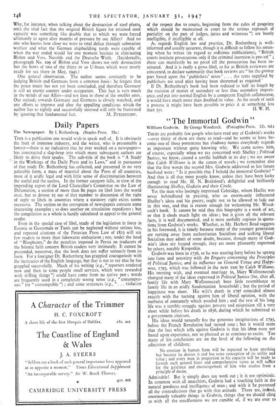Daily Papers
The Newspaper. By I. Rothenberg. (Staples Press. 35s.) Tuts is a publication one would wish to speak well of. It is obviously the fruit of immense industry, and the writer, who is presumably a lawyer—there is no indication that he ever worked on a newspaper— has constructed a slag-heap into which many subsequent authors are likely to drive their spades. The sub-title of the book is " A Study * in the Workings of the Daily Press and its Laws," and in pursuance of that study Dr. Rothenberg has collected, and presented in no very palatable form, a mass of material about the Press of all countries, most of it aridly legal and with little sense of discrimination between the useful and the useless. In the former category falls, in view of the impending report of the Lord Chancellor's Committee on the Law of Defamation, a section of more than 8o pages on libel laws the world over, but to devote 25 out of that number to discussion of the right of reply to libels in countries where a statutory right exists seems excessive. The section on the corruption of newspapers contains some interesting examples ; so does another on circulation expedients ; but the compilation as a whole is hardly calculated to appeal to the general reader. Even in the special case of libel, study of the legislation in force in Estonia or Guatemala or Tunis can be neglected without serious loss, and repeated citations of the Peruvian Press Law of 1823 will stir few readers to more than lukewarm enthu,siasm ; nor, under the head of " Blasphemy," do the penalties imposed in Persia on traducers of the Islamic faith concern British readers very intimately. It cannot be pretended, moreover, that the book does not suffer seriously from its form. For a foreigner Dr. Rothenberg has grappled courageously with the intricacies of the English language, but that is not to say that he has grappled successfully. Much of his writing (e.g.," reporters rendered now and then to some people small services, which were rewarded with trifling things ") could have come from no native pen ; words are frequently used in a completely wrong sense (e.g., " contemptu- ous" for " contemptible ") ; and some sentences (e.g., . . . violation of the respect due to courts, beginning from the rules of propriety which should be maintained in court to the serious reproach of partiality on the part of judges, juries and witnesses ") are barely intelligible, if intelligible at all. As regards English law and practice, Dr. Rothenberg is well- informed and usually accurate, though it is difficult to follow his mean- ing when he writes (in regard to seditious publications), " British courts institute prosecutions only if the criminal intention is pro:ed " ; there can manifestly be no proof till the prosecution has been in- stituted. And it is really a gross libel, so far as British reviewers are concerned, to declare summarily that book reviews are " for the greater part based upon the `publishers' notes' . . . the texts supplied by publishers are used after having been shortened as required.' If Dr. Rothenberg's book had been reduced to half its length by the excision of matter of secondary or less than secondary import- ance, and put into normal English by a competent English collaborator, it would have much more than doubled its value. As the result of such a process it might have been possible to price it at something less


































 Previous page
Previous page